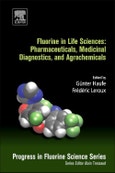Fluorine in Life Sciences: Pharmaceuticals, Medicinal Diagnostics and Agrochemicals, volume four in Alain Tressaud's Progress in Fluorine Science series, presents a critical, multidisciplinary overview of the contributions of fluorinated products to solve important global issues in various life science fields, particularly in medicinal chemistry, molecular imaging techniques and agriculture. Edited by recognized experts, this book provides unique coverage of the wide-ranging uses and implications of fluorine and fluorinated compounds. Topics include medicinal monitoring and diagnosis, 19F MRI in medicine and in vivo cell tracking, 18F-labeled radiopharmaceuticals, brain imaging and neurology, risk assessment of reactive metabolites in drug discovery, and more.
Edited by Alain Tressaud, past Chair and founder of the CNRS French Fluorine Network, each book in the collection also includes the work of highly-respected volume editors and contributors from both academia and industry who bring valuable and varied content to this active field.
Please Note: This is an On Demand product, delivery may take up to 11 working days after payment has been received.
Table of Contents
1. Emerging Fluorination Methods in Organic Chemistry Relevant for Life Science Application2. Fluorination Patterns in Small Alkyl Groups: Their Impact on Properties Relevant to Drug Discovery
3. Polyfluorinated scaffolds in drug discovery
4. Case Studies of Fluorine in Drug Discovery
5. Recent development in fluorinated antibiotics
6. Fluorosugars as inhibitors of bacterial enzymes
7. Microbial metabolism of fluorinated drugs
8. Influence of fluorination on alcohol hydrogen-bond donating properties
9. Synthesis and Applications of Backbone-Fluorinated Amino Acids
10. 19F-labelled Amino Acids for NMR Structure Analysis of membrane-bound peptides
11. In vivo 19-Fluorine Magnetic Resonance Imaging
12. Fluorine-18 radiolabeling of biologics
13. Serotonin receptor imaging by [18F]-PET
14. Organoboronates: Captors of 18F-fluoride for One-step Radiofluorination of Biomolecules
15. Silicon-Fluoride-Acceptor-based 18F-Radiopharmaceuticals: From basic SiFA chemistry towards its clinical application
16. Bio-relevant fluorine-containing N-heterocycles
17. Recent applications of fluorine in crop protection New discoveries originating from the unique heptafluoroisopropyl group
18. The Role of Fluorine in the Design of Nicotinic Acetylcholine Receptor (nAChR) Competitive Modulators
Authors
Gunter Haufe Westfälische Wilhelms-Universität Münster, Organisch-Chemisches Institut, Corrensstr. 40, D-48149 Münster, Germany. Günter Haufe graduated from the University of Leipzig (Germany) with a Diploma degree in 1972 and a Dr. rer. nat. in 1975 both with Professor Manfred Mühlstädt. After basic military service he started his independent scientific career and did a Habilitation and venia legendi in Leipzig (1985). In 1986 he worked as a Research Fellow of Centre National de la Recherche Scientifique (CNRS) with André Laurent at the Université Lyon I (France) for 6 months, and as a visiting scientist with Jakko Paasivirta at the University of Jyväskylä (Finland). From 1988-1991 he was an Associate Professor (Docent) of Bioorganic Chemistry at the University of Leipzig before he was appointed at his present position as a Professor of Organic Chemistry at the University of Münster (Germany). Guest Professorships led him to Lyon, Poznan, Rouen, Valencia, Nagoya, Shanghai and to the University of Florida, Gainesville (USA) as a Paul Tarrant Visiting Professor. He was awarded with the "Friedrich-Wöhler-Preis in 1985 and elected as a member of the European Academy of Sciences in 2015. From 2008-2010 he served as a Chair of the group of German fluorine chemists within the German Chemical Society. He published a book on "Alicyclic Chemistry" together with Gerhard Mann (1989) and edited a monograph "Fluorine and Health" together with Alain Tressaud (2008). He was an Associate Editor of "Advances in Fluorine Science" and is a Regional Editor of the Journal of Fluorine Chemistry since 2008.His research interest span from Organofluorine Chemistry, particularly fluorination methodology, selective synthesis of fluorinated analogues of natural products and 18F-tracers for the Positron-Emission-Tomography, via Preparative Organic Chemistry including total synthesis of natural products, to enzymatic methods for the preparation of organic compounds. Frederic Leroux Université de Strasbourg, Université de Haute-Alsace, CNRS, UMR 7042-LIMA, F-67000 Strasbourg, France??. Frederic Leroux is CNRS Research Director at the University of Strasbourg. He is Director of the joint CNRS-Bayer laboratory of organofluorine chemistry and director of the molecular chemistry department (UMR CNRS 7042-LIMA) at the European School of Chemistry, Polymers and Material Sciences (ECPM). His research is published in >110 peer-reviewed papers, 18 patents, 8 book chapters and presented by invitation at >100 (inter)national conferences. He is Fellow of the Royal Society of Chemistry (FRSC) and member of the European Academy of Sciences and Arts. He is also a member of the International Scientific Committee of the Moissan Prize (Fluorine Chemistry) and Director of the French Fluorine Network.
His scientific interest covers various fields, based on a fruitful interplay of several objectives (a) the synthesis of biologically relevant molecules, (b) asymmetric methodologies using organic and organometallic chemistry, (c) organofluorine chemistry and (d) application of the objectives to industrial problems, which led to strong industrial collaborations.








